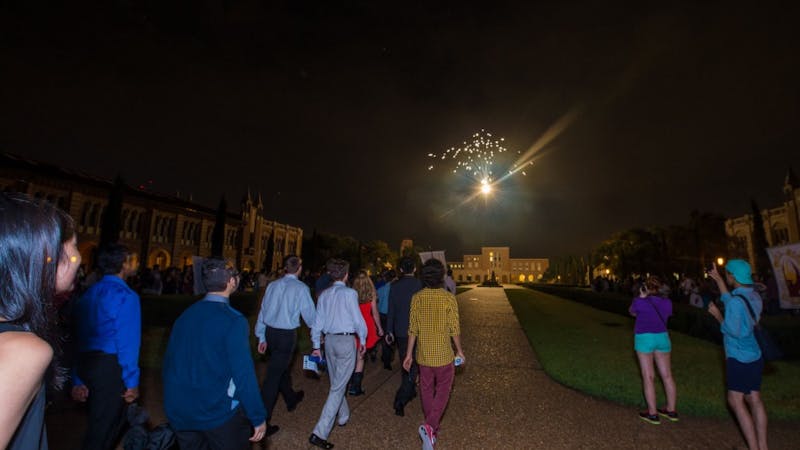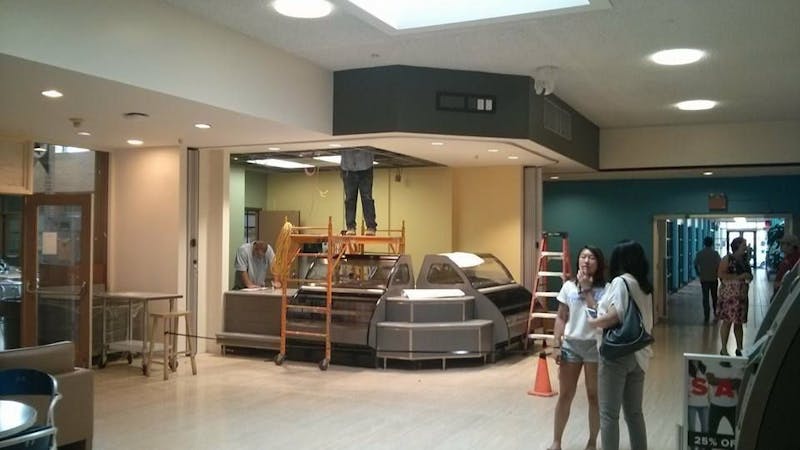NEWS
8/27/15 11:18am
By Andrew Ligeralde
Several new students faced last-minute changes to their living situations due to a higher than expected number of students committing to Rice University this fall. According to Dean of Undergraduates John Hutchinson, as of the beginning of August, 11 new students were initially scheduled to share rooms with upperclassmen in order to secure a spot on campus.“We are seeking to provide incentives to upperclassmen to overcrowd their rooms, some financial incentives for them to do that to make spaces for new students,” Hutchinson said. “I would prefer not to overcrowd the rooms of new students since they don’t have a context for knowing what they’re volunteering for if they do that.”Mark Ditman, associate vice president of Housing and Dining, said the incentives work in such a way to prevent students from taking advantage and overcrowding just to save on room and board.“What we don’t want to do is incentivize people to overcrowd a room to save money,” Ditman said. “We think that can have some bad consequences over time. ... Once a bed became available in the college, you had to unwind the overcrowd, and that person would go in the open bed. If they wanted to overcrowd instead of the open bed they could, but the financial incentive would terminate once a bed became open.”However, according to Hutchinson, in cases where colleges could not accommodate any more students, new students were transferred from their original assigned colleges to other colleges where extra beds opened up over the summer. “Four new students chose to live in a different college because we could house them there, and then chose to become members of that college rather than remain members of the college they were originally assigned to,” Hutchinson said. “Two other students very much wanted to remain assigned to the college they were originally assigned to, and in the end, they were actually able to get beds where they were originally assigned.” According to Baker Orientation Week coordinator Sylvia Omozee, two international students originally assigned to Will Rice College were switched to Baker College the day before O-Week started. “They were basically putting new students wherever there were rooms around campus,” Omozee, a Baker College senior, said. “It just so happened that there were things with upperclassmen at Baker who went off campus and there was a double that opened in Baker ‘New New.’”According to Omozee, while the advisors adapted quickly and the new students have adjusted well, the situation was precarious, especially from the new students’ perspective. “I think it’s unfair to promise new students housing in their specific college without intentions of keeping that promise,” Omozee said. “As a new student, I would’ve been wondering, ‘Why me? Why not another student? Was there something about my roommate form that made them think they didn’t want me in their college?’” Hutchinson said that while administration did in fact receive complaints from several of the new students’ parents, his office addressed them accordingly.“We received a small number of concerns from parents, but not very many,” Hutchinson said. “We certainly made sure that we let parents know that we were attentive to the situation, that we were not worried about whether people were going to be able to get beds or not, but that there were some uncontrolled factors that had to play out before we would know for certain where everybody was going to be housed. And parents seemed to understand that pretty well.”According to Omozee, the situation also put a strain on the coordinators, who worked all summer to match roommates and assign rooms, only to find that the expected number of students was higher. Omozee said that while the coordinators were not specifically at fault, certain colleges received complaints from students and parents. “One particular college kept getting angry emails from at first a new student, then the student’s parents asking why they didn’t have a room,” Omozee said. “Which is completely understandable to be upset about. So we definitely got some heat from that, not specifically Baker, but we have received a lot of heat that is not necessarily our fault, and there was nothing we could do about it. One thing I’m really proud about was that the other 31 coordinators and was that we handled it in a way that despite the things that happened we could still figure it out and put on O-Week.”Omozee said she thinks overcrowding would have been more successful had the financial incentives proposed to upperclassmen been greater. “I think [administration] just needs better policies if something like this were to happen again,” Omozee said. “The discount given is not enough. So maybe if a higher discount was given, then maybe a better discount would be a solution to that issue. It was more like, this is what you get coordinators, just deal with it.”According to Hutchinson, only two students accepted incentives to move off campus and create space for incoming students.“We did in fact put incentives out there, and students did not find those incentives enticing enough to want to make a move,” Hutchinson said. “We examined different ways to encourage different students to move, and in the end, it was a relatively small number who moved to make room for some of the entering freshmen. It turned out it was only two students who did that. But it turned out that that was what we needed.”According to Hutchinson, the administration will take steps to reduce last-minute transfers in the future while housing many students on campus as possible. However, uncertainties persist that make this a difficult process. “We will make adjustments next year to try to minimize anxiety, but in the end we knew we were going to be able to house people,” Hutchinson said. “We try to balance two conflicting demands. One is we’d like to have as much flexibility as possible and try to house everybody in a situation that is optimal for them. And we’d also like to have as many people live on campus because people want to live on campus. We don’t want to have a bunch of people living off campus while we have a bunch of vacancies.”According to Omozee, however, as O-Week got nearer, there was not much more that could have been done to account for a higher yield. “I think because the issue of overcrowding wasn’t realized until later in the game, there was no way really to move the date of college assignments without students wondering, ‘Where is my college assignment?’” Omozee said. “It would have been better than people coming to O-week and they don’t know what college they’re going to. In all honesty, I think this was the best case scenario for the situation we were given. I’m not happy with the situation. But at this point it’s done. The new students love Baker, so it’s fine.”According to Susann Glenn, communications manager for H&D, the overcrowding system has existed since before 2000 and has been well received by students.“We haven’t heard any pushback because we incentivize certain things for those who participated in that,” Glenn said. “So if anything, we received eagerness from those who have agreed to help us out. … This isn’t a decision that we make on our own as an administration. We need students, to make sure we’re serving [their] needs.”




